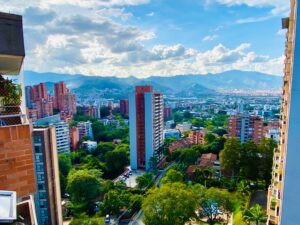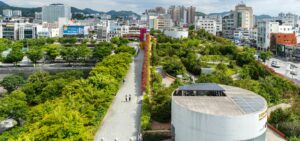 For most of 2020, the outdoors was the only place we could exercise or socialise due to COVID-19. Green spaces have positive effects on our mental health and wellbeing, physical health and fitness, child development and social cohesion(1). Populations living in greener environments also have lower levels of differences in health related to low-income (health inequality)(2). However, COVID-19 has highlighted (pre-existing) avoidable, unfair differences (inequalities) in access to green spaces. Those living in low-income households in towns and cities often lack access to private gardens (12% of households in Britain, higher among Black and Minority Ethnic (BAME) households) and public parks. In London, the wealthiest areas have 10% more public outdoor space than the most deprived areas and about half of those living in the most deprived areas are from BAME backgrounds(3–7). As a kicker, population density is higher in deprived areas, so more people share less space. Finally, those living in deprived areas are more likely to perceive local green spaces as unsafe and be less likely to use them(8).
For most of 2020, the outdoors was the only place we could exercise or socialise due to COVID-19. Green spaces have positive effects on our mental health and wellbeing, physical health and fitness, child development and social cohesion(1). Populations living in greener environments also have lower levels of differences in health related to low-income (health inequality)(2). However, COVID-19 has highlighted (pre-existing) avoidable, unfair differences (inequalities) in access to green spaces. Those living in low-income households in towns and cities often lack access to private gardens (12% of households in Britain, higher among Black and Minority Ethnic (BAME) households) and public parks. In London, the wealthiest areas have 10% more public outdoor space than the most deprived areas and about half of those living in the most deprived areas are from BAME backgrounds(3–7). As a kicker, population density is higher in deprived areas, so more people share less space. Finally, those living in deprived areas are more likely to perceive local green spaces as unsafe and be less likely to use them(8).
Unsurprisingly, with gyms and indoor recreation spaces closed, and Government rules to ‘stay local’, the number of people using local spaces, such as city woods and parks, increased in some areas during the pandemic. The pandemic has also changed the way many of us interact with our local environments and may have changed the type and distribution of greenspaces people want(9). Large, open spaces may make social distancing easier, but, small local spaces may be important for groups like children, older people and those with mobility limitations.
Data on how people have used public greenspaces during the pandemic, and how the pandemic has changed the outdoor spaces that people want, may provide evidence to justify protecting, improving, managing and funding them in locations that promote access to the outdoors for everyone. Efforts to improve access to greenspaces should aim to avoid “green gentrification”, where property values rise in response to improvements in greenspaces, displacing low-income residents(5). Improvements should also be sensitive to the potential to alienate some groups from greenspaces further. All research should involve those who could especially benefit from greenspaces, such as children, older people and those living in more deprived areas, and who are often less well-represented in decisions affecting their local spaces(10).
The GroundsWell programme of research and engagement aims to transform our cities from the ground up. Our vision is for a world where communities, organisations and government work together to ensure urban green and blue spaces benefit everyone, especially those who need them most. The programme will be shaped and developed in three pioneer cities: Belfast, Edinburgh and Liverpool, working in partnership with communities and providing a template for improving urban greenspaces in other cities in the UK and beyond.
 The current pandemic has been a stark reminder that humanity placing too many pressures on nature has damaging consequences. Investing in our urban greenspaces should be considered not only a public health and social investment but a chance to rebalance our relationship with nature to protect against future pandemics(11). By investing in urban greenspaces, additional benefits including job and food creation, biodiversity promotion, lessening of extreme heat in urban areas and removal of carbon from the atmosphere may coincide with health benefits. Realising these benefits will require a shift in the balance of decision making to place more weight on protecting, enhancing and providing more appropriate greenspaces designed with local communities.
The current pandemic has been a stark reminder that humanity placing too many pressures on nature has damaging consequences. Investing in our urban greenspaces should be considered not only a public health and social investment but a chance to rebalance our relationship with nature to protect against future pandemics(11). By investing in urban greenspaces, additional benefits including job and food creation, biodiversity promotion, lessening of extreme heat in urban areas and removal of carbon from the atmosphere may coincide with health benefits. Realising these benefits will require a shift in the balance of decision making to place more weight on protecting, enhancing and providing more appropriate greenspaces designed with local communities.
Recognition of the need to maintain or increase publicly accessible urban greenspaces, particularly for minoritized and marginalised groups, is not new – it is reflected in the Sustainable Development Goals (SDG 3: good health and wellbeing and SGD 11: sustainable and resilient cities), its importance has been amplified by the COVID-19 pandemic. However, austerity measures following the global financial crisis of 2008 resulted in parks and other greenspaces facing a decade of substantial funding cuts in the UK (and other countries) that hit poorer areas hardest, exacerbating unfair differences (inequalities) in access to well-maintained public greenspaces(12). Protecting our urban greenspaces from the threat of austerity 2.0 as we navigate out of the COVID-19 pandemic will be crucial and should concern everyone. As the toll COVID-19 would take on economies worldwide became clear, many people hoped this would be the opportunity to transform the world economy, with broad public support for a green recovery(13). COVID-19 economic recovery programs present an opportunity for sustainable transformation if they can be leveraged to simultaneously protect and restore nature and tackle climate change(11). Reducing health inequalities should be central in a just, healthy and green recovery. We must take this opportunity.
- World Health Organization Regional Office for Europe. Urban Green Space Interventions and Health: A Review of Impacts and Effectiveness [Internet]. [cited 2020 Jun 10]. Available from: http://www.euro.who.int/__data/assets/pdf_file/0010/337690/FULL-REPORT-for-LLP.pdf?ua=1
- Mitchell R, Popham F. Effect of exposure to natural environment on health inequalities: an observational population study. The Lancet. 2008 Nov 8;372(9650):1655–60.
- Access to garden spaces: England – Office for National Statistics [Internet]. [cited 2020 May 26]. Available from: https://www.ons.gov.uk/economy/environmentalaccounts/methodologies/accesstogardenspacesengland
- One in eight British households has no garden – Office for National Statistics [Internet]. [cited 2020 May 26]. Available from: https://www.ons.gov.uk/economy/environmentalaccounts/articles/oneineightbritishhouseholdshasnogarden/2020-05-14
- Wolch JR, Byrne J, Newell JP. Urban green space, public health, and environmental justice: The challenge of making cities ‘just green enough’. Landsc Urban Plan. 2014;125:234–44.
- House of Commons Communities and Local Government Committee. Public Parks: Seventh Report of Session 2016-17 [Internet]. [cited 2020 Jun 8]. Report No.: HC45. Available from: https://publications.parliament.uk/pa/cm201617/cmselect/cmcomloc/45/45.pdf
- Duncan P, McIntyre N, Cutler S. Coronavirus park closures hit BAME and poor Londoners most. The Guardian [Internet]. 2020 Apr 10 [cited 2020 Nov 18]; Available from: https://www.theguardian.com/uk-news/2020/apr/10/coronavirus-park-closures-hit-bame-and-poor-londoners-most
- Jones A, Hillsdon M, Coombes E. Greenspace access, use, and physical activity: understanding the effects of area deprivation. Prev Med. 2009 Dec;49(6):500.
- Honey-Roses J, Anguelovski I, Bohigas J, Chireh V, Daher C, Konijnendijk C, et al. The Impact of COVID-19 on Public Space: A Review of the Emerging Questions. Cities Health [Internet]. 2020 [cited 2020 May 26]; Available from: https://www.tandfonline.com/doi/full/10.1080/23748834.2020.1780074
- Uberoi E. Political disengagement in the UK: who is disengaged? p. 41.
- Markard, J R D. A COVID-19 recovery for climate | Science. Science. 368(6490):447.
- Local authority budget cuts and health inequalities – ProQuest [Internet]. [cited 2020 May 13]. Available from: https://search.proquest.com/docview/1943871251?pq-origsite=gscholar
- Harvey, F. UK public ‘supports green recovery from coronavirus crisis’. The Guardian [Internet]. 2020 Jun 22 [cited 2021 Mar 22]; Available from: https://www.theguardian.com/environment/2020/jun/23/uk-public-supports-green-recovery-from-coronavirus-crisis


